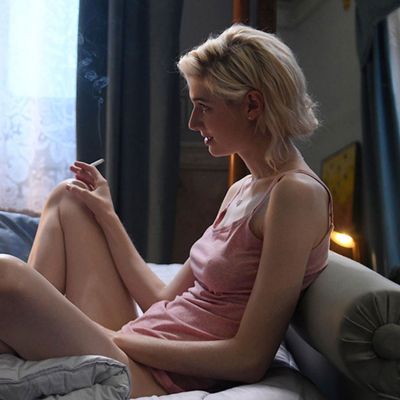
Claes Bang is six-four, and Elizabeth Debicki is six-three and when they fall into bed at the beginning of The Burnt Orange Heresy, it looks like two long-necked swans mating. As elegant as this casual coupling of supernal international talent is, what’s sexier is actually the scene that follows, when their characters loll in bed spinning out stories of the lives they’re going to live together. James Figueras, the art critic played by Bang, proposes that he and his new fling will get engaged, then she’ll leave him and he’ll throw himself off the Milan Cathedral in despair. Said fling, an American named Berenice Hollis whom Debicki imbues with an air of mystery, counters that James will turn her into a sex worker to support his career, something she’ll devote herself to out of love. Underscoring this exchange is the assumption that they’re never going to see each other again, that they are bodies in space that will spin off from this mutually enjoyable collision in opposite directions. Yet the banter between them is so arch and so easy, so clearly that of two people who match on a certain level, that James feels moved to extend their time together by inviting Berenice along to what he calls a “fancy art party.” It is, more accurately, a trip to a villa on Lake Como, one owned by a powerful collector who wants something and believes James is the man who can get it for him.
The Burnt Orange Heresy is Giuseppe Capotondi’s decade-in-coming follow-up to his acclaimed 2009 The Double Hour, a film I liked and whose plot twists I’ve retained almost no memory of. As I watch The Burnt Orange Heresy, that starts to feel as if it’s by design. Like The Double Hour, it is a romantic thriller that starts off heavily rooted in the romance. Berenice wanders into a lecture that James, whose star has fallen considerably, is giving to a group of tourists about the power of criticism — power, as he presents it, that has to do with how little most people actually understand about what makes art good. He delivers this lesson with enough verve that his audience doesn’t seem to pick up on the fact that he has called them all rubes. Berenice, though, sees more — and also sees pretty quickly that her new lover has a pill addiction, which, like her past, they opt not to talk about. They don’t talk about his shambolic apartment or the money troubles he’s avoiding, either. They do their best to linger in the comfortable shallows of conversation for as long as possible as they drive up to an extravagantly beautiful “summer cottage” owned by a rich Brit named Joseph Cassidy, played with a delicious sneer by Mick Jagger in his first significant acting role since The Man From Elysian Fields in 2001.
Things happen after this — things involving a reclusive painter, played by Donald Sutherland, whom Cassidy has invited to live on the property and who is more famous for work that was lost in a 1968 fire than work anyone has actually seen. The Burnt Orange Heresy was adapted from a 1971 novel by Charles Willeford, which takes place in Florida. In transporting the action to upscale expat Italy, Capotondi and screenwriter Scott B. Smith evoke a different kind of sunlit noir — one reminiscent of The Talented Mr. Ripley but without the suspense. Capotondi is stubbornly reluctant to build anything resembling tension even when the pressure on the characters increases and when James is cornered in a situation in which he has no one to trust and no options. Even a late moment of violence happens so languidly, and is so underreacted to, that for a while it seems it will pass without comment or consequence. As a thriller, The Burnt Orange Heresy is entirely underwhelming, but that doesn’t mean it isn’t worth watching. One of the reasons it seems so loath to push its story along is it seems to want to spend more time in the company of its leads while they soak in a bit of the borrowed luxury that’s being packed up around them in anticipation of the end of the season.
To work in the arts, the movie understands, is to frequently be surrounded by money without necessarily having any of one’s own, a dissonance that can drive some people to distraction. Lingering with Bang, who leans into his most dissolutely boyish qualities for the role, and Debicki, who is fully owning her near-alien beauty, you can become convinced of the secondhand injustice their characters may feel over this. As they dawdle by the water in linens and light florals, you can buy, just for a little while, that they deserve these trappings more than other people do, if only because they make them look so good — and even if the ultimate message of the movie is what a sham they all are.
More Movie Reviews
- Fernanda Torres Is a Subtle Marvel in I’m Still Here
- Grand Theft Hamlet Is a Delightful Putting-on-a-Show Documentary
- Presence Is the Best Thing Steven Soderbergh’s Done in Ages


